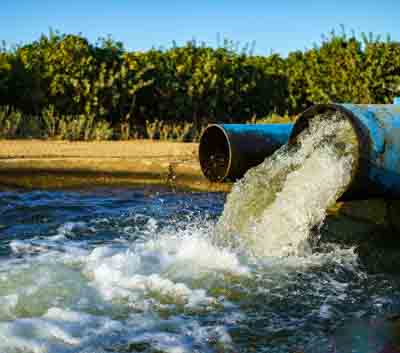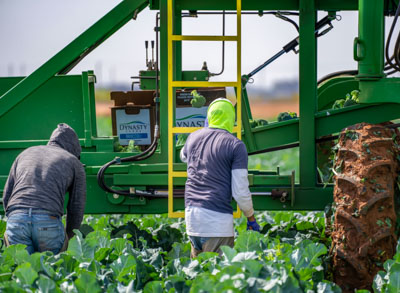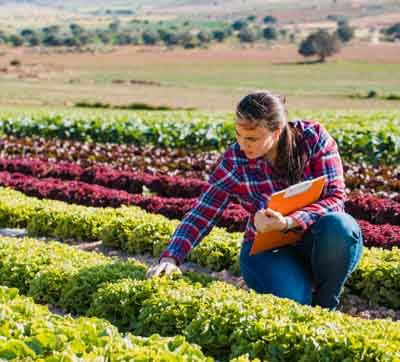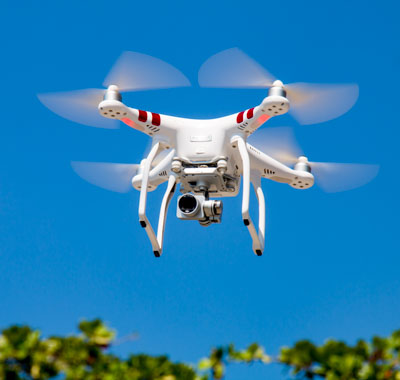Farmers face many challenges while managing their farm crops. Especially in the face of climate change, pests, diseases, and market fluctuations. In this blog post, we will explore top five farm crop management challenges and how farmers can overcome them.
Irrigation Water Management

One of the main challenges is irrigation water management. Water is essential for crop growth, but too much or too little can cause problems. Droughts will reduce crop yields and quality, while over-irrigation can damage crops and soil.
To improve irrigation effectiveness, farmers need to monitor water availability and use irrigation systems that are efficient and sustainable. Irrigation practices that conserve water, such as mulching, cover cropping, and crop rotation will also save precious irrigation water.
If you are an almond (permanent crop) grower, here you will find more useful information about Almond Irrigation Management.
Labor Management

Farm labor shortage is a serious problem that affects the productivity and profitability of many farms in the US. According to Purdue University, there will be 59,400 annual Ag job openings between 2022 and 2026, but 40 percent of them will be unfilled. Many factors contribute to this situation, such as low wages, lack of interest among young people, immigration policies, and consumer demands.
To counterbalance the labor shortage, many farmers are adopting modern and automated technologies. Such as mechanical harvesting, crop varieties which allow mechanical weed and pest elimination and artificial intelligence. All that, so farmers can reduce their dependence on farm labor.
If you are an alfalfa grower, here is a blog post about Alfalfa Yield Difference Grown on Drip Irrigation vs Flood. Converting flood irrigated fields to drip irrigation will also minimize labor requirements.
Pest and Disease Management

Another common challenge for farmers is pest and disease management. Pests and diseases can reduce crop quality and quantity and increase production costs.
Farmers need to use integrated pest management (IPM) strategies that combine biological, cultural, mechanical, and chemical methods to control pests and diseases. They also need to diversify their crops and use resistant varieties to reduce the risk of outbreaks.
Here is a blog post about What Is Integrated Pest (IPM) Management and Why You Should Care.
Crop Market Management

Crop market management is another challenge which farmers often face, specially produce crop growers. Farmers need to sell their crops at a fair price and meet the demand and preferences of consumers. They also need to cope with price fluctuations and market shocks that can affect their income and livelihoods.
Farmers need to access reliable market information and participate in collective marketing groups that can increase their bargaining power and reduce transaction costs. They also need to add value to their crops by processing, packaging, and branding them.
Other possible solutions for farmers on crop market management are:
- Using crop management software to monitor and optimize crop production, profitability, and traceability
- Adopting climate-adapted technologies to reduce climate-induced volatility and improve crop resilience
- Diversifying crop portfolio to reduce market risk and increase income opportunities
Technology Adoption for Farm Crop Management

Technology adoption is yet another challenge and at the same time it is the solution for many challenges mentioned above. Yes, adopting modern technologies can be expensive, time-consuming and comes with a learning curve. It can also make it cumbersome to keep up with the latest advances in crop management technologies.
As previously mentioned, for better farm crop management, technology often is the solution. One of the biggest obstacles in adopting new technologies is time and money. Installing sensors or upgrading irrigation systems is expensive.
If you are a farmer who is battling one or more of the farm crop management challenges above, I recommend starting with investing in practical farm crop management software. Crop management software will help you to minimize most of the challenges mentioned above, for example:
- Irrigation management
- Labor management
- Crop scouting which will help you with pest and disease control
- Crop planning and harvest date estimation
You can register and try AgNote’s farm crop management software free for seven days. AgNote includes dedicated management areas for row crops, permanent crops, and vegetable crops.